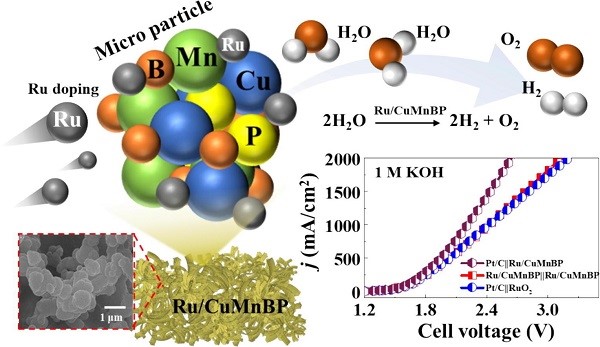Prof. Ji-hoon Lee‘s Team Develops a New Micro-cluster Type Ru-doped Copper-manganeseboron-phosphorus
- admin
- 2024-09-13
- 2813
· Professor Ji-hoon Lee‘s Team (Department of Electronic Engineering) Develops a New Micro-cluster Type Ru-doped Copper-manganese-boron-phosphorus Electrocatalyst
For Low-cost, High-efficiency Hydrogen
Production
- Implementation of a new micro-cluster type
electrocatalyst fabricated using Ru doping via hydrothermal deposition and
immersion-assisted methods -
- Paper published in the world-renowned Journal of
Colloid and Interface Science (IF: 9.4), by Elsevier
Professor Ji-hoon
Lee’s research team (Department of Electronic Engineering), together with
researcher Sul-sam Im (first author), has successfully implemented the world’s
first Ru-doped copper-manganese-boron-phosphorus (Ru/CuMnBP) electrocatalyst,
fabricated using a Ru doping method through hydrothermal deposition and
immersion-assisted techniques.

Ru/CuMnBP
microclusters exhibit relatively low HER/OER transition overpotentials of 11mV
and 85mV at 10mA/cm2 in 1M KOH. It also shows a low 2-E switching
cell voltage of 1.53V at 10mA/cm2 for overall water splitting, which
is comparable to the benchmark electrode of Pt/C||RuO2. At an ultra-high
current density of 2,000mA/cm2, the bifunctional Ru/CuMnBP exhibits
an extremely low 2-E cell voltage of 3.13V and good stability in 1M KOH for
more than 10 hours. The excellent electrochemical performance is attributed to
the large electrochemically active surface area provided by the micro-cluster
structure, the high intrinsic activity and active site density of the optimized
CuMnBP micro-cluster achieved through component ratio adjustments, and the
beneficial Ru doping effect, which enhances conductivity and stability. By
using a small amount of Ru through a simple absorption doping approach, the
electrochemical reaction rates for both HER and OER are significantly improved,
making the Ru/CuMnBP micro-cluster a promising candidate for advanced
electrocatalyst applications.

Schematic of the hydrothermal reaction and Ru immersion approach for the new dual-function Ru/CuMnBP micro-particle electrocatalyst for overall water-splitting applications
(Journal
of Colloid and Interface Science, 2024)
The research team
consists of Shusen Lin (Researcher, Kwangwoon University - First Author),
Rutuja Mandavkar (PhD Candidate, Kwangwoon University), Md Ahasan Habib (PhD
Candidate, Kwangwoon University), Sumiya Akter Dristy (PhD Candidate, Kwangwoon
University), Mehedi Hasan Joni (PhD Candidate, Kwangwoon University), Jae-hun
Jeong (Research Professor, Kwangwoon University - Corresponding Author), and
Ji-hoon Lee (Professor, Kwangwoon University - Corresponding Author). The study
was conducted solely by Kwangwoon University. Researcher Sul-sam Im (Shusen
Lin) enrolled in Kwangwoon University's integrated master's and PhD program in
the Department of Electronics in 2019 and is currently a postdoctoral
researcher at the Kwangwoon University Institute of Nanodevices. Researcher
Sul-sam Im has participated in various research fields to date and has
published numerous papers. During his fellowship, researcher Sul-sam Im
expressed his ambition to publish further groundbreaking research and continue
his postdoctoral training and studies at a leading university in his home
country.
This research was supported by the Brain Korea
21 Plus (BK-21) program led by the National Research Foundation of Korea and
the Ministry of Education, as well as by Kwangwoon University. The findings
were published in the scientific journal Journal of Colloid and Interface
Science (JCR IF: 9.4) in August 2024, under the title 'Fabrication of Ru-doped
CuMnBP Micro Cluster Electrocatalyst with High Efficiency and Stability for
Electrochemical Water Splitting Application at Industrial-Level Current
Density.'
Meanwhile, Professor
Ji-hoon Lee's team is conducting research on high-performance energy materials
with excellent energy efficiency, various metasurface-based nanomaterials, and
optoelectronic devices and system technologies. To date, they have published
over 170 papers in high-ranking SCI JCR journals. Professor Ji-hoon Lee serves
as an Assistant Editor and Editorial Board member for SCI journals of globally
renowned publishers, as well as a Guest Editor for various SCI-grade
international journals. He also holds several committee and organizer positions
for international conferences. He has also served as a reviewer for Advanced
Materials (IF 27.4), Nano Energy (IF 16.8), Advanced Functional Materials (IF
18.5), and over 30 other SCI journals in the past two years.
* Publication Web link :
https://doi.org/10.1016/j.jcis.2024.08.009
?